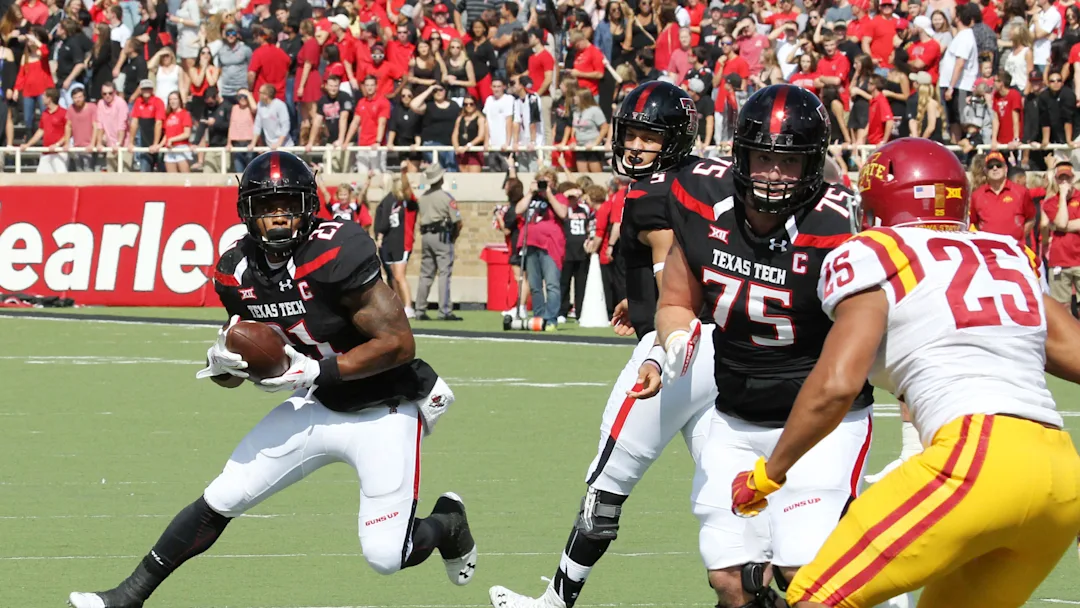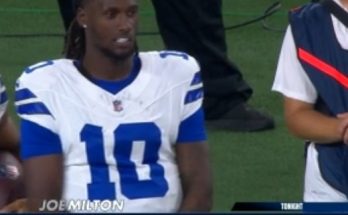DeAndre Washington’s 2015 season stands as a shining testament to determination, explosiveness, and excellence in college football. For Texas Tech fans, it was a campaign that etched itself into Red Raider lore—a year when Washington not only carried the ball but also carried the hopes of a program seeking to reassert itself in the Big 12. With his blistering speed, sharp vision, and tireless work ethic, Washington delivered one of the most memorable individual seasons in school history, and perhaps one of the most underappreciated nationally in the modern era.
The numbers speak volumes. Washington rushed for 1,492 yards and 14 touchdowns on the ground, while adding another 385 yards and two touchdowns through the air. That brought his all-purpose yardage total to an astounding 1,877 yards, placing him among the elite backs in the nation for that year. In a conference known for aerial fireworks, Washington brought a powerful ground game that gave the Red Raiders a much-needed dimension of balance. He wasn’t just padding stats—he was keeping defenses honest, breaking off game-changing runs, and bringing consistency to a volatile league.
What made Washington’s season even more impressive was how he did it. This wasn’t a case of a player racking up numbers in blowouts or against weak opponents. Washington produced against the best. He racked up 188 rushing yards and four touchdowns against Kansas State. He posted 248 yards and three scores in a must-win game versus Texas, becoming the first Texas Tech player to top 1,000 yards rushing in consecutive seasons since 1998. That performance against the Longhorns, on Thanksgiving night in Austin, was especially symbolic—it was Texas Tech’s first win over their in-state rival in Austin since 1997, and Washington was the undeniable catalyst.
His ability to turn a simple handoff into a highlight-reel sprint or grind out the tough yardage in clutch moments made him indispensable. Time and again, Washington proved he wasn’t just a speedster—he was a complete back. He picked up blitzes in pass protection, caught balls out of the backfield with receiver-like finesse, and never shied away from contact. He played with heart, smarts, and the kind of grit that turned him into a leader both on and off the field.
Washington’s 2015 season also came with a sense of redemption. Earlier in his career, he had battled through injuries, including a torn ACL that threatened to derail his potential. Lesser athletes might have faded into the background, but Washington responded with resolve. He came back stronger, faster, and more focused. By his senior year, he wasn’t just a key contributor—he was the heartbeat of the team. His resilience became a source of inspiration for teammates and a symbol of what hard work and belief can yield.
That leadership extended beyond the box score. Coaches lauded his film study habits and attention to detail. Teammates admired his relentless training and quiet confidence. He wasn’t a loud or flashy presence in the locker room—he led with example. And when the Red Raiders needed a spark, a momentum shift, or someone to put the game on his shoulders, Washington was the player they turned to.
Statistically, his 2015 campaign is one of the best in Texas Tech history. He became the first Red Raider to lead the Big 12 in rushing since the conference’s inception in 1996. His 1,492 rushing yards stand second only to Byron Hanspard’s 1996 campaign in the school record books. But unlike Hanspard, whose season came during an option-heavy era, Washington’s feats came in an offense known primarily for its passing. That context makes his accomplishments all the more incredible.
In many ways, Washington was the perfect running back for Texas Tech’s evolving offensive identity. Head coach Kliff Kingsbury’s Air Raid system was quarterback-driven, designed to spread defenses out and create mismatches. But Washington’s emergence as a dominant runner forced opponents to adjust. Defensive coordinators had to game-plan for both the deep ball and Washington’s ability to tear through gaps. He punished defenses that dropped extra defenders into coverage. He shredded fronts that dared to leave him unaccounted for. He thrived on mismatches and misdirection, but could also deliver in straight-up power situations.
NFL scouts took notice. At just 5-foot-8, Washington didn’t fit the traditional prototype for a feature back, but his production, toughness, and versatility made him a legitimate draft prospect. His performance in 2015 earned him All-Big 12 First Team honors and an invitation to the NFL Combine. Ultimately, he was selected by the Oakland Raiders in the fifth round of the 2016 NFL Draft, fulfilling a dream forged through perseverance and sacrifice.
Yet for Texas Tech fans, Washington’s legacy is about more than just the stats or the professional leap. He helped redefine what was possible for a running back in an Air Raid system. He showed that the Red Raiders could pound the rock just as effectively as they could air it out. He became a symbol of grit, loyalty, and evolution—someone who stayed the course, embraced the grind, and delivered a season for the ages.
His impact can still be felt in Lubbock today. Washington’s success opened the door for future backs in the system. It helped Texas Tech recruit running backs who believed they could thrive in a pass-heavy offense. It also helped Kingsbury continue developing a more complete offensive attack, blending traditional Air Raid elements with more modern concepts centered around a balanced approach.
Even years later, Red Raider fans still talk about the 2015 season with a mix of awe and pride. The highlights—those cutback runs, the breakaway sprints, the touchdown bursts—are etched into the program’s collective memory. They remember how Washington took over games, how he made defenders miss, how he lowered his shoulder when he needed to pick up the extra yard. They remember how he did it all with humility and class.
That season, Texas Tech finished 7–6, capped by a trip to the Texas Bowl. While the team didn’t reach elite status, Washington’s contributions helped stabilize the offense and allowed the program to remain competitive in the face of stiff Big 12 competition. His ability to consistently perform in one of the toughest conferences in the nation made him a cornerstone, even as quarterbacks and receivers often took the spotlight.
DeAndre Washington’s 2015 campaign wasn’t just statistically historic—it was culturally significant. It shifted perceptions, energized fans, and raised the bar for what could be accomplished in a system where running backs once seemed like afterthoughts. His name is now synonymous with excellence in Texas Tech football history, and his story stands as a blueprint for perseverance, versatility, and unmatched production.
As time goes on and new stars emerge, Washington’s legacy will endure. For those who witnessed it live, the memories of his dazzling runs and fearless attitude will remain vivid. And for those who come later—those who don the scarlet and black and dream of glory—they’ll know his name, see his stats, and hear the stories of the 2015 season that changed everything. In a program built on grit and guts, DeAndre Washington gave Texas Tech one of its greatest seasons ever—and in doing so, he became a legend.



